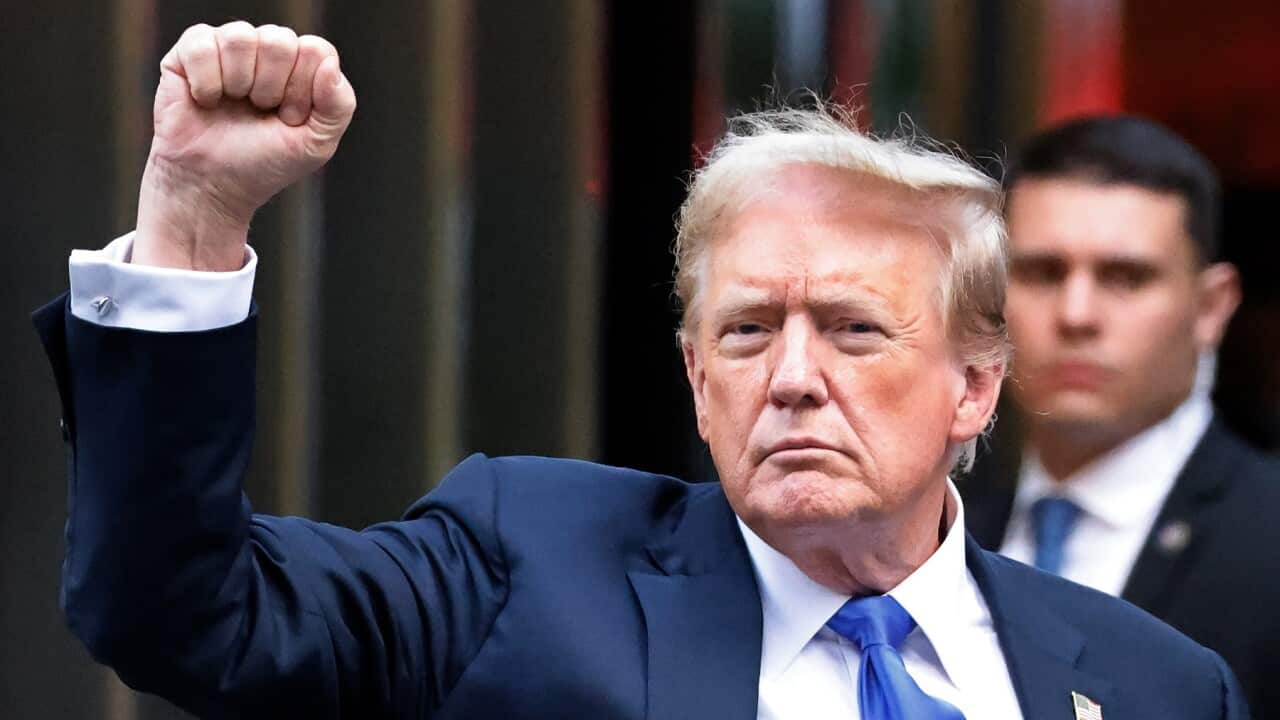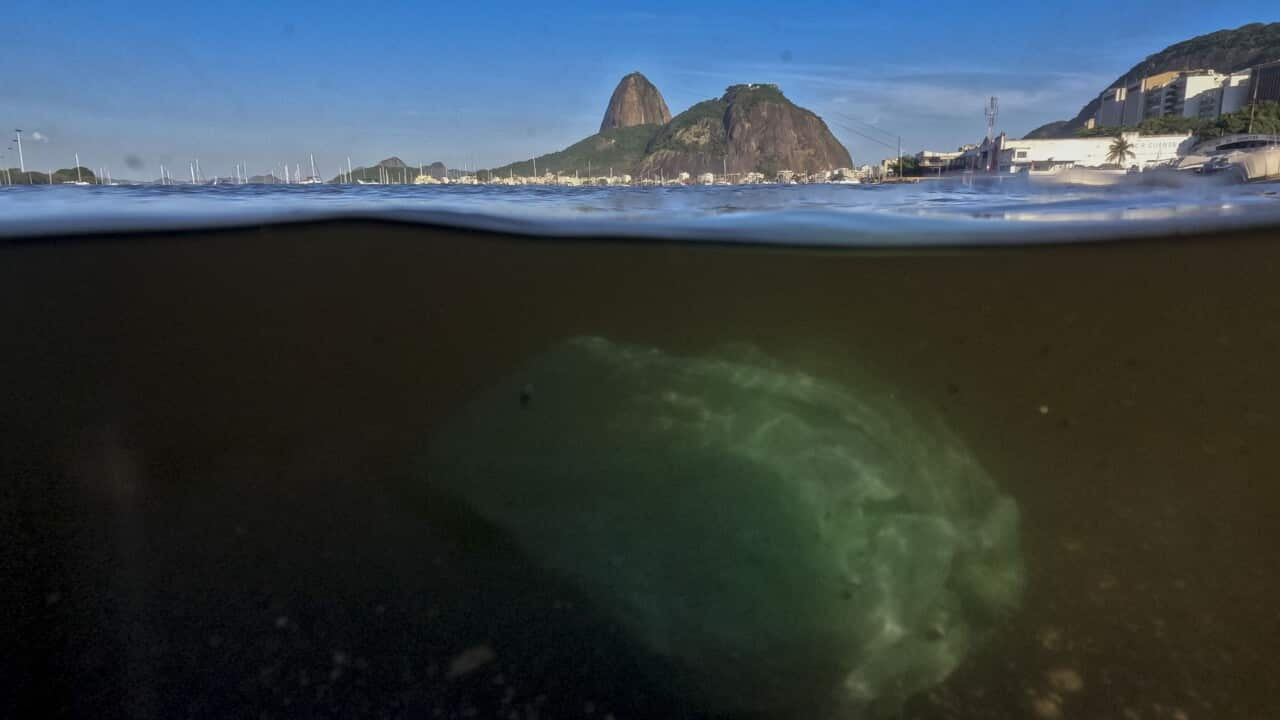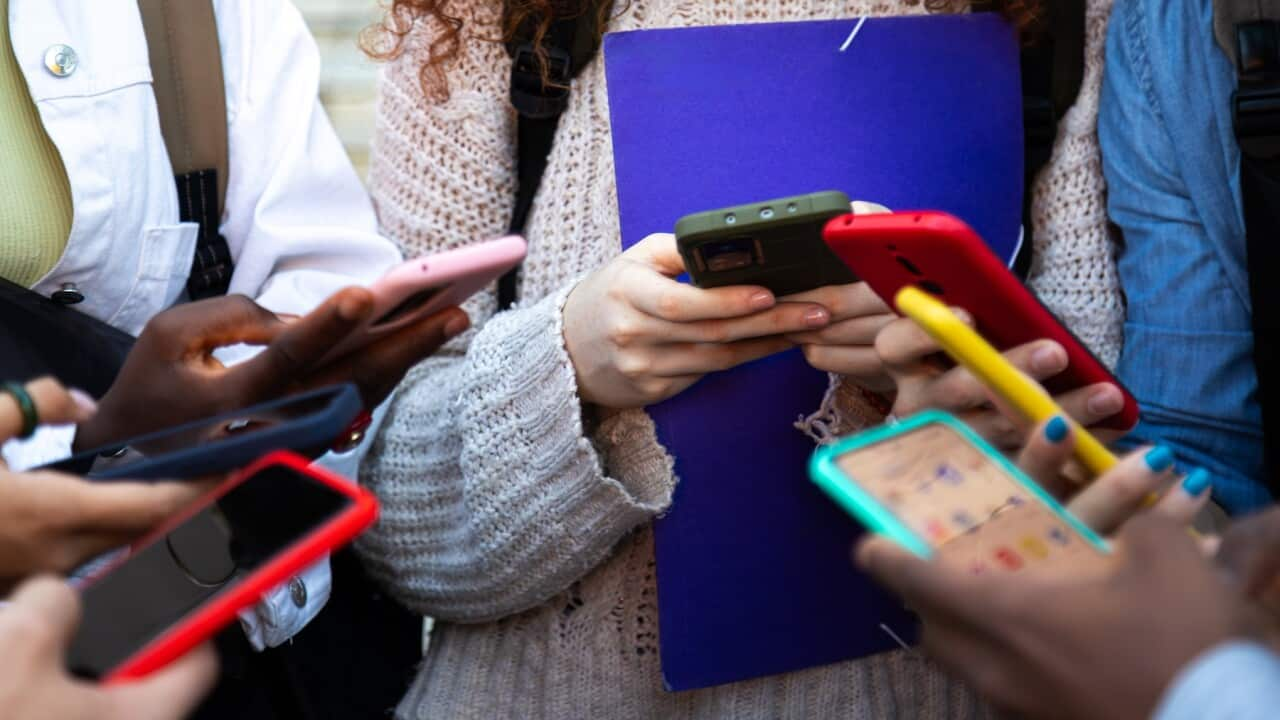TRANSCRIPT
An unemotional Donald Trump ignored reporters' questions as he left the Manhattan Criminal Court after the verdict in his hush-money trial.
A 12-member jury had deliberated for more than 11 hours over two days, but the verdict - after a half-hour recess to fill out forms - came in a matter of minutes.
The former president reportedly sat still as Judge Juan Merchan asked the foreperson to read the decision on the first of several charges of falsifying documents, in relation to money paid to silence former adult performer Stormy Daniels.
He then remained unmoved as they gave the same answer - "guilty" - for all 34 charges.
But speaking outside the New York courthouse where he had just become the first of any president - current or former - to be convicted of a crime, he lashed out at the proceedings.
“It's a rigged trial, a disgrace. They wouldn't give us a venue change. We were at five per cent or six per cent in this district, in this area. This was a rigged, disgraceful trial. The real verdict is going to be November 5 by the people, and they know what happened here, everybody knows what happened here.”
The 77-year-old presumed Republican presidential candidate, who was released without bail, described himself as a "very innocent man" - but he is now a convicted felon.
In the state of Florida, where he voted in 2020, felons are normally only allowed to vote after completing their sentences.
But crucially, the conviction does not bar him from running for office in his battle to unseat President Joe Biden in November's presidential elections.
In a statement, President Biden's campaign said the result showed that no one was above the law, and the "only one way" to keep Mr Trump out of the White House was "at the ballot box".
In comments which harked back to his divisive rhetoric in the lead up to his 2016 election win, Trump accused his opponent of manufacturing the case against him.
“Our country's gone to hell, we don't have the same country any more. We have a divided mess, we're a nation in decline, serious decline. Millions of millions of people pouring into our country right now, from prisons and from mental institutions, terrorists, and they're taking over our country. We have a country that's in big trouble. But this was a rigged decision right from day one, with a conflicted judge who should never have been able to try this case, never. And we will fight for our constitution, this is long from over, thank you very much.”
The court heard from 22 witnesses over six weeks, including Stormy Daniels, real name Stephanie Clifford, whose alleged 2006 sexual encounter with Trump was at the centre of the case.
Mr Trump, who was married to current wife Melania at the time, has denied ever having sex with Ms Daniels.
He also denied falsifying logging for reimbursements to his then-lawyer, Michael Cohen - another key prosecution witness - for a payment of US$130,000 to silence her ahead of the 2016 election.
Hush money payments aren't inherently illegal, but prosecutors argued the payments, which they said Trump identified as "legal expenses" to hide their true nature, were a campaign finance crime.
Mr Cohen, Judge Juan Merchan and New York District Attorney Alvin Bragg have all come under verbal attack in the media from Trump and his supporters.
Mr Bragg, speaking after the verdict, joined the judge in thanking the jury, whose identities were kept secret, and paid tribute to the work of his colleagues, who led the first criminal indictment of a former president in U-S history.
“I did my job. Our job is to follow the facts and the law without fear or favour. And that's exactly what we did here. And what I feel is gratitude to work alongside phenomenal public servants, who do that each and every day. I did my job, we did our job, many voices out there. The only voice that matters is the voice of the jury, and the jury has spoken.”
The judge has set sentencing for July 11, four days before the Republican National Convention in Milwaukee, where Trump is due to receive the party's formal nomination.
Mr Bragg refused to comment on whether his team would seek a jail sentence for Mr Trump, or the likely content of an appeal by his lawyers.
Trump could in theory be sentenced to four years behind bars for each count, a maximum of 136 years, although a probationary sentence is more likely for a first offence.
The former president, who pleaded not guilty, is expected to appeal, and has put out a fundraising request, titled "I am a political prisoner", and announced he will make a public statement on Friday.
Former Federal Prosecutor Robert Mintz said likely grounds of appeal include the novelty of the way the prosecution applied the law.
“We're going to see a lot going on in terms of an appeal but that appeal will not be decided for months, perhaps even years down the road. So going into this election year, the former president is going to stand a convicted felon and no appeal will be resolved before the election. My guess is that we will see some period of incarceration but I think it's going to be very limited. It's going to be more symbolic than it's going to be punitive, but I'll be surprised if it's a straight probationary sentence. I think it's going to be some minimal time in prison, which will really be a shocking result and will present this country with a situation that we've never seen before.”
But the verdict - and any potential jail time - is unlikely to sway die-hard Trump supporters, or Democrats already convinced of his guilt.
Trump's fellow Republicans quickly condemned the verdict, with House of Representatives Speaker Mike Johnson saying in a statement on X ((formerly known as Twitter)) it was a "a shameful day in American history".
These voters, reacting to the verdict outside Trump's Mar-a-Lago residence in Florida, said it changed nothing.
WOMAN: “It doesn't affect it in one way at all. Nothing, there's no thought process we are voting for President Trump. That's it, done.”
MAN: “No, it does not affect it at all. I was not voting for him. I didn't vote for him in the past. I think he's a despicable human being. A jury of his peers found him guilty. He will appeal it. And, you know, I don't think this is a jailable offense, in my opinion. I mean it's possible that they could send him to jail.”
Trump also faces more serious federal and state charges of conspiring to overturn the results of the 2020 election won by President Biden, and for holding onto secret documents after leaving the White House - those trials are unlikely to get underway before the election.
Elaine Kamarck is a Senior Fellow at the Brookings Institution in Washington.
She said polling shows the New York conviction could sway small but powerful sections of votes against both Mr Trump, and President Biden.
“This election then boils down to a very small number of people. A very, very small number of people. And there is some indication from polling that some people have said if he was convicted of one of these crimes, they would be less likely to vote for him. So, I do think that when you're looking at this very small number of people that could, in fact, have a big impact on the election.”













